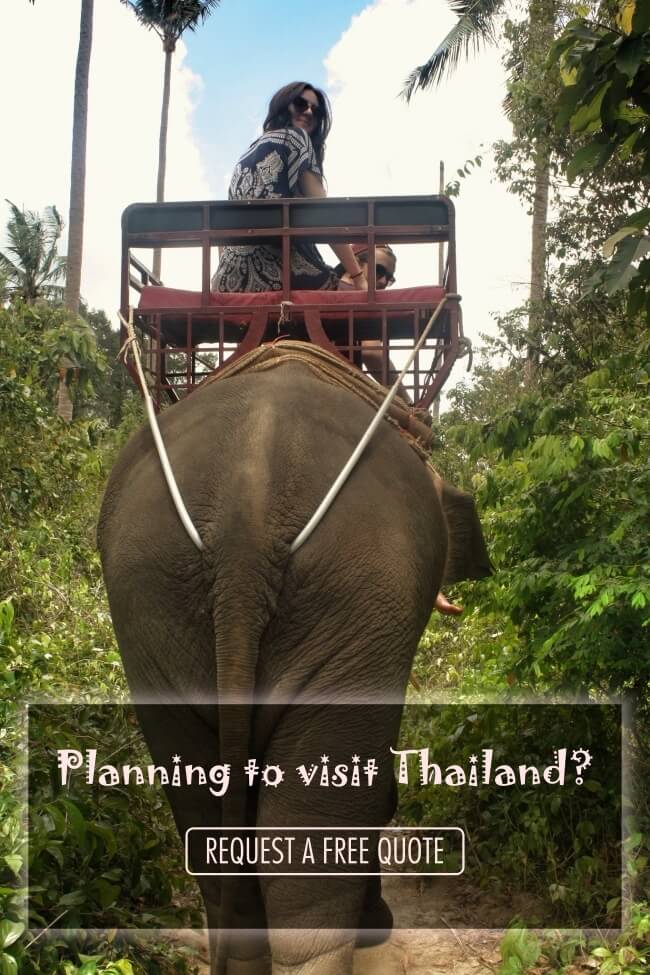Thailand Cultural insights
Aiming to share our passion of Laos, we gather here general infomation and anecdotes for you to better understand the country's cultural, people and story.
 Our blog latest article about Thailand
Our blog latest article about Thailand
 Cruising the Mekong River: A Journey of Scenic Beauty and Cultural Delights
Cruising the Mekong River: A Journey of Scenic Beauty and Cultural Delights

Taking a cruise on the fascinating Mekong River offers a unique and memorable travel experience. The Mekong River, one of the longest rivers in Asia, flows through several countries, including China, Myanmar, Laos, Thailand, Cambodia, and Vietnam. Each destination along the river offers its own distinct cultural, historical, and natural attractions. In this article, we will go over what you can expect when cruising the Mekong River.
 Thailand Scraps More Covid-19 Rules to Welcome Tourists
Thailand Scraps More Covid-19 Rules to Welcome Tourists

International travelers to Thailand will no longer be required to show proof of vaccination or ATK test results from October 1st, 2022 onward.
In a new move to attract travelers during peak season, Thailand is doing away with the requirement of needing vaccination certificates or Covid-19 negative results in the case of unvaccinated passengers. Additionally, those infected with Covid-19, but have mild symptoms don’t need to isolate from next month. The same applies to those who test positive but display no symptoms.
Public Health Minister Anutin Charnvirakul announced these changes on Thursday after the National Communicable Diseases Committee (NCDC) had a meeting on Wednesday.
Instead of isolating those who have contracted the disease would be required to wear a mask, socially distance themselves from others and wash their hands frequently for the first five days. They also need to stay away from those who are immunocompromised and vulnerable.
Dr. Sophon Iamsirithaworn, deputy director-general of the Department of Disease Control, informed that since the present Covid-19 mutation doesn’t cause serious symptoms in most people, disease control measures can be relaxed.
National Security Council secretary-general Supoj Malaniyom added that the new measures are being put in place to help improve the economic conditions of the country.
“The primary aim will be to ensure the economy is back on track so people could earn their livelihoods once more,” he said.
 Phi Ta Khone - Thailand Ghost Festival
Phi Ta Khone - Thailand Ghost Festival

Phi Ta Khone, Thailand Ghost Festival
Thailand street food
Best Thailand Beaches
 How many days do you need and how to plan the best itinerary in Thailand?
How many days do you need and how to plan the best itinerary in Thailand?

How long to spend in Thailand may seem like a ridiculous question to address, but if you have plenty of time and aren’t sure how much to dedicate, this blog will definitely help you out.
How long can you stay in Thailand?
Well, as long as you like! From 10 days to a month, there are various ways you can travel across Thailand and uncover its secrets. Advising an ideal trip length for Thailand is a bit of a complex challenge, as it depends on several factors such as the places you wish to visit, the activities you plan to join, or if you want to combine Thailand with its neighbor countries.
Stay tuned! We are going to sort all these things out including the step-by-step guide to create the best itinerary in Thailand.
 Vietnam or Thailand Travel: Which one should you visit?
Vietnam or Thailand Travel: Which one should you visit?

"Should I visit Thailand or Vietnam?" is some of the most frequently asked questions that we have from our travelers
Well, Vietnam and Thailand are the most popular holiday destinations in Southeast Asia. They are similar in climate and food, though obviously different in culture, lifestyle and travel experience.
Below we list 13 major differences between the two countries, to give you a quick overview and help you decide which to visit first. These are based on our own travel experiences, investigations, and partnerships with local operators.
 Boun Bang Fai - Rocket Festival in Thailand and Laos
Boun Bang Fai - Rocket Festival in Thailand and Laos

The Rocket Festival (Boun Bang Fai) is a merit-making ceremony traditionally practiced by ethnic Lao people near the beginning of the wet season in numerous villages and municipalities, in the regions of Northeastern Thailand and Laos. Celebrations typically include preliminary music and dance performances, competitive processions of floats, dancers and musicians on the second day, and culminating on the third day in competitive firings of home-made rockets. Local participants and sponsors use the occasion to enhance their social prestige, as is customary in traditional Buddhist folk festivals throughout Southeast Asia.
The festival in Thailand also includes special programs and specific local patterns like Bung Fai (Parade dance) and a Beautiful Bung Fai float such as Yasothon the third weekend of May, and continues Suwannaphum District, Roi Et on the first weekend of June, Phanom Phrai District Roi Et during the full moon of the seventh month in Lunar year's calendar each year. The Bung Fai festival is not only found in Isan or Northeasthern Thailand and North Thailand and Laos, but also in Amphoe Sukhirin, Narathiwat.
 Thailand eases entry rules from May 1st, 2022
Thailand eases entry rules from May 1st, 2022

Bangkok, 22 April, 2022 – Thailand’s Centre for COVID-19 Situation Administration (CCSA) today approved the lifting of the RT-PCR testing requirement for international arrivals beginning 1 May, 2022, and introduced two new entry schemes specifically customised for vaccinated and unvaccinated travellers.
 Pre-travel Covid tests for arrivals lifted from April 1
Pre-travel Covid tests for arrivals lifted from April 1

The Centre for Covid-19 Situation Administration on Friday resolved to discontinue the requirement that visitors pass a pre-travel Covid-19 test, from April 1, but testing on arrival will continue.
The change in procedure was announced by CCSA spokesman Taweesilp Visanuyothin.
He said the requirement for pre-travel tests would end for all visitors, whether arriving by Test & Go, Sandbox or quarantine channels.
People who enter the country through Test & Go or Sandbox programmes would be given an RT-PCR test on arrival, and be required to perform an antigen self-test on day 5 after arrival, monitored at their hotel.
Sandbox visitors would remain in their reception areas for five days. Visitors in the quarantine scheme, including people caught sneaking in, would be kept in isolation for five days and have an RT-PCR test on day 4 or 5 after arrival.
The CCSA would continue to require visitors to have Covid-19 insurance coverage of at least US$20,000 but was likely to reduce it later, Dr Taweesilp said.
Also, from April 1 people would be able to arrive by land through Satun province in the South, in addition to current Nong Khai, Udon Thani and Songkhla.
Arrivals by sea would be allowed through Surat Thani ports, in addition to the present Phuket and Chon Buri.
By air, the reopening would include Hat Yai airport in addition to the current Suvarnabhumi, Don Mueang, Phuket, Krabi, Samui, Chiang Mai and U-tapao airports.
The CCSA hoped to expand the reopening by air to all airports, depending on their readiness, in May, Dr Taweesilp said.
 COVID-19 vaccine guide for travelers to Thailand
COVID-19 vaccine guide for travelers to Thailand

Thailand currently approves 8 COVID-19 vaccines, and everyone 18 years of age and older should get fully vaccinated for COVID-19 before travelling to the Kingdom, while rules differ for those under 18 years. Here’s an update to our guide to COVID-19 vaccines for international travelers to Thailand.
 Everything you need to know about SHA & its certificates
Everything you need to know about SHA & its certificates

Searching for tourism information about Thailand during Covid, you always see the terms of SHA and its related certificates of SHA+ or SHA++ (Extra plus) sticked to the suppliers of tourism service such as accommodations, restaurants, or tourist attractions.
Feeling confused?
Here you come to the right place!
In this article, we will give you the explanation of What is SHA & the meaning of its certificates, and some of the frequently asked questions that you may have relating to the terms.
Check it out!
 How to register for Test & Go on Thailand Pass system?
How to register for Test & Go on Thailand Pass system?

From 1 February 2022, Thai government has adjusted Thailand reopening measures by allowing travelers from all countries of the world to register in the Thailand Pass system to obtain permission to enter Thailand under the Test & Go program.
Here you will find information how to register for Test & Go and the process of getting Thailand Pass approval for traveling to Thailand on the official website of Thailand Pass system: https://tp.consular.go.th/
 A guide to Thailand Happy Quarantine
A guide to Thailand Happy Quarantine

The best way to travel to Thailand during this time would be through the Test and Go scheme; however, this entry scheme is applicable for fully-vaccinated travelers only.
For unvaccinated travelers, you only have one option to travel to Thailand through the Happy Quarantine (formally called Alternative Quarantine) scheme and undergo quarantine.
From January 11th, 2022, international travelers from any country around the world, regardless of their vaccination status, can enter Thailand under the Happy Quarantine Entry Scheme.
[UPDATED ON APRIL 1ST, 2022] Pretravel testing is no longer required, while the quarantine period has been reduced to 5 days with one RT-PCR on Day 5.
Check the below article for everything you need to know about this entry scheme.
 Everything about Thailand Blue Zone Sandbox Scheme
Everything about Thailand Blue Zone Sandbox Scheme

Pre-travel testing is no longer required, and after completing 5 days within the Sandbox destinations, travellers will be allowed to travel domestically within Thailand.
 Everything about Thailand Pass system
Everything about Thailand Pass system

The Kingdom of Thailand is reopening for tourism and will allow international travel to Thailand, provided that certain conditions and protocols are met.
These protocols will include the newly created “Thailand Pass System” which replaces the old Certificate of Entry (COE) system that was implemented to help deal with the pandemic's impact on Thailand’s tourism industry. That's why some websites still refer to it as the new Thailand Pass. It is in essence just a registration system that allows the Thai authorities to manage their quarantine scheme.
Check out everything you need to know about Thailand pass system
 What is happening if you have a positive Covid test result when traveling in Thailand?
What is happening if you have a positive Covid test result when traveling in Thailand?

The below article is written by Gregers Møller from ScandAsia.com and we think it is useful for you to have the better idea of what is actually happening on the ground. Check it out before you go or you will regret it!
**********
Travelers to Thailand whose PCR tests return a positive are in a very high risk of being caught up in a web of rules that nobody warned them of before their departure.
 A comprehensive guide to Thailand’s Test & Go Scheme
A comprehensive guide to Thailand’s Test & Go Scheme

UPDATED ON APRIL 1ST, 2022.
Travellers will be allowed to enter the kingdom without the need to show proof of a negative RT-PCR test within 72 hours of travel.
Check out the detail below to have everything you need to know about the Test & Go Scheme and what you need to do before planning your trip to Thailand.
Learn more about the effort to reopen Thailand here
 Asia Reopening – Which countries are open for tourism and travel now?
Asia Reopening – Which countries are open for tourism and travel now?

Since the beginning of the COVID-19 pandemic, Asian countries has taken the cautious approach to inbound travel and has had some of the strictest border restrictions and closures. At the moment, the nations of the region are in the beginning stages of reopening their borders for tourism, with every country introducing its own regulations.
The “unlocking” statuses vary widely. Travelers entering Asian countries may be required to do everything from going into quarantine, submitting negative COVID-19 test results, presenting proof of health insurance, and proof of vaccination (known a vaccine passports).
There is an understandable uncertainty with how you should travel to the Asian region if you are planning to. This is why we present you the list of 19 Asian countries, along with details on the current travel situation. As each country applies precisely defined regulations, you should always check the official websites listed in the article below for the latest government announcements.
 Reopening Thailand: Everything you need to know when traveling during covid
Reopening Thailand: Everything you need to know when traveling during covid

From 1 June, 2022, foreign nationals are still required to apply for a Thailand Pass, with essential information including passport details, vaccination, and an US$10,000 health insurance policy. The system will then automatically issue a QR code for the applicants. Thais will be exempt from a Thailand Pass registration.
The following rules will be in effect from June 1st, 2022, with specific requirements for vaccinated and unvaccinated / not fully vaccinated travellers from all countries/territories with scheduled arrivals from this date.
FYI: The Kingdom is planning to remove Thailand Pass System from June 1st, 2022. Stay tuned!
 To discover Thailand
To discover Thailand














































